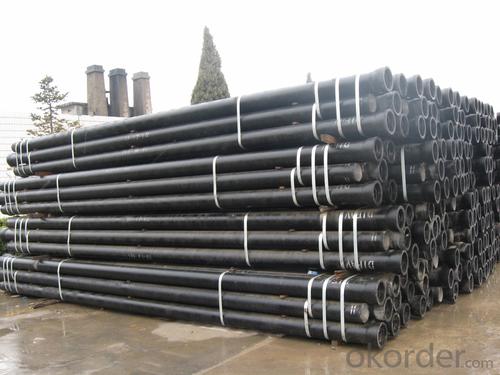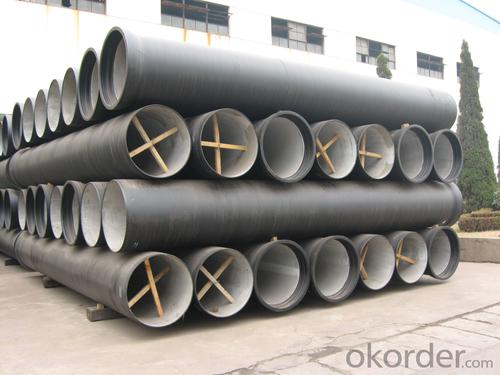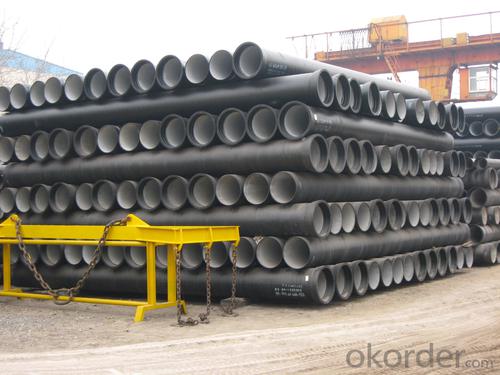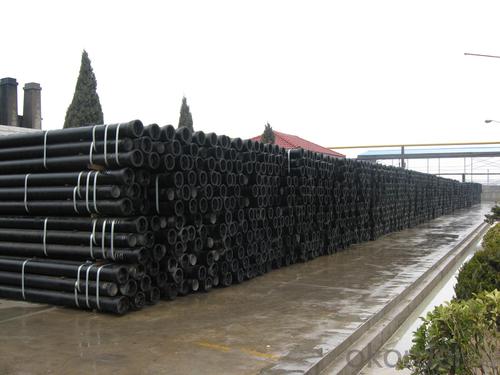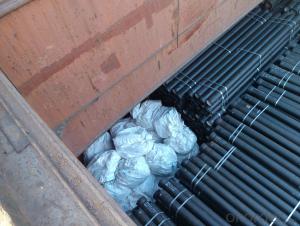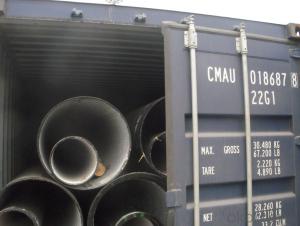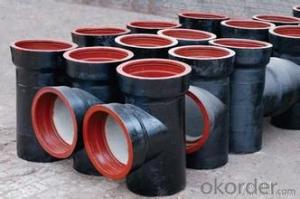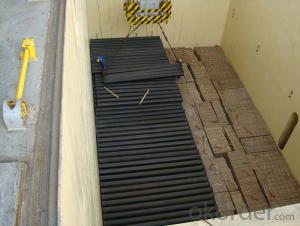DUCTILE IRON PIPE DN100 K9
- Loading Port:
- China Main Port
- Payment Terms:
- TT or LC
- Min Order Qty:
- 21 m.t.
- Supply Capability:
- -
OKorder Service Pledge
OKorder Financial Service
You Might Also Like
Specification:
1) The standard of pipe: ISO2531:1998, K9
2) Effective length: 6m
3) Inner cement line: Portland cement line as per ISO4179
4) Zinc coating: at least 130g/m2 as per ISO8179
5) Bitumen painting: at least 70um as per ISO8179
6) With 100% quantity of NBR ring, or SBR ring, or EPDM ring as per ISO4633
7) DN80mm-800mm
8) High strength, lighter than grey iron, good corrosion resistance, no furring, small flow resistance, easy fixing, long life tome about 100 yeas
9) Produced by Hangzhou chunfeng machine
10) Checked by automatic inspection equipment
11) Composition:
Chemical composition | ||||||
Chemical composition | Ductile Cast Iron Pipe (%) | Grey iron pipe (%) | Steel pipe (%) | |||
C | 3.5-4.0 | 3.2-3.8 | 0.1-0.2 | |||
Si | 1.9-2.6 | 1.4-2.2 | 0.15-0.4 | |||
Mn | 0.15-0.45 | 0.4-0.6 | 0.3-0.6 | |||
P | ≤0.06 | ≤0.3 | 0.02-0.03 | |||
S | ≤0.02 | ≤0.1 | 0.02-0.03 | |||
Mg | 0.03-0.06 | |||||
12) Feature:
Mechanical properties | ||||||
Ductile Cast Iron Pipe | Grey Iron Pipe | Steel Pipe | ||||
Tensile Strength(Mpa) | ≥420 | 150-260 | ≥400 | |||
Yield Strength(Mpa) | ≥300 | No Confirmation | No Confirmation | |||
Bending Strength(Mpa) | ≥590 | 200-360 | ≥400 | |||
Elongation (%) | ≥10 | Neglected | ≥18 | |||
Brinell Hardness(HBS) | ≤230 | ≤230 | About 140 | |||
13) T type mechanical joint
14) Packing: in bulk or container
Specifications
1.20 years manufacturing and exporting experiences.
2.ISO2531,BSEN545 standard.
3.DN80-DN1800,Centrifugal casting,K9
- Q: Ductile iron pipe joint damage, water leakage, want to see the connection with other pipe fittings, how to operate?!
- The ink tube is really not good. Oh, have you tried blocking it with cement or plugging it with putty?Just pick up PE haha
- Q: Can ductile iron pipe be used for mining applications?
- Yes, ductile iron pipe can certainly be used for mining applications. Ductile iron is a type of cast iron that exhibits significant tensile strength, flexibility, and durability, making it suitable for demanding and rugged environments like mining. Its high strength-to-weight ratio allows for easy handling and installation, making it a cost-effective choice for mining operations. Ductile iron pipes are resistant to corrosion and have excellent mechanical properties, including high impact and fatigue resistance. These properties make them ideal for transporting various materials commonly found in mining, such as water, slurries, and abrasive ores. Additionally, ductile iron pipes have a long lifespan, ensuring reliable performance and minimal maintenance requirements in mining operations. Furthermore, ductile iron pipes can withstand high pressures and maintain their integrity under extreme conditions, making them suitable for underground mining applications. They can handle the demanding requirements of deep mining operations, including the transport of water for cooling or dust suppression, as well as the drainage of wastewater or mine dewatering. Overall, ductile iron pipes provide the necessary strength, resilience, and corrosion resistance required for mining applications. Their versatility, durability, and ease of installation make them a valuable choice for mining operations, ensuring efficient and reliable material transport while minimizing downtime and maintenance costs.
- Q: What are the different methods for testing ductile iron pipe?
- There are several methods for testing ductile iron pipe, including visual inspection, hydrostatic pressure testing, ultrasonic testing, magnetic particle inspection, and mechanical testing.
- Q: What is the typical wall thickness of ductile iron pipes?
- The wall thickness of ductile iron pipes can vary depending on their size and intended use, with a typical range of 0.25 inches (6.35 mm) to 0.5 inches (12.7 mm). However, when dealing with larger diameter pipes or those meant for high-pressure applications, the wall thickness may exceed these measurements. To determine the suitable wall thickness for a ductile iron pipe, it is crucial to refer to industry standards and project specifications.
- Q: What is the expected corrosion protection system for ductile iron pipes?
- The expected corrosion protection system for ductile iron pipes typically includes a combination of internal and external coatings, such as cement mortar lining and an external polyethylene or epoxy coating. Additionally, sacrificial anode systems or impressed current cathodic protection may be employed to further enhance the corrosion resistance of the pipes.
- Q: What are the different corrosion protection options for ductile iron pipe?
- There are several corrosion protection options available for ductile iron pipe to ensure its longevity and durability. These options include: 1. Cement Mortar Lining: This involves coating the inner surface of the pipe with a layer of cement mortar, which acts as a barrier between the pipe and corrosive elements in the water or soil. Cement mortar lining provides excellent corrosion resistance and can last for several decades. 2. Polyethylene Encasement: This method involves wrapping the ductile iron pipe with a layer of polyethylene material. The polyethylene acts as a physical barrier, protecting the pipe from external corrosive elements. Polyethylene encasement is commonly used in aggressive soil conditions and can offer long-lasting protection. 3. Internal and External Coatings: Various types of coatings can be applied to the inner and outer surfaces of the ductile iron pipe to provide corrosion resistance. These coatings can be epoxy, polyurethane, or fusion-bonded epoxy (FBE) coatings. These coatings create a barrier between the pipe and the surrounding environment, preventing corrosion. 4. Cathodic Protection: This method involves using an electrical current to protect the pipe from corrosion. Cathodic protection systems can be either galvanic (sacrificial anode) or impressed current systems. These systems direct the flow of electrons to prevent the oxidation of the ductile iron pipe. 5. Zinc Coating: Zinc coating, also known as galvanizing, involves applying a layer of zinc to the surface of the ductile iron pipe. The zinc acts as a sacrificial anode, corroding instead of the iron pipe. Zinc coating provides effective corrosion protection, particularly in soil conditions with low resistivity. It's important to note that the choice of corrosion protection option for ductile iron pipes depends on various factors such as the environment, water chemistry, soil conditions, and expected service life. Consulting with corrosion protection specialists and engineers can help in selecting the most suitable option for specific applications.
- Q: Are ductile iron pipes suitable for bridge crossings?
- Yes, ductile iron pipes are suitable for bridge crossings. Ductile iron pipes are known for their high strength and durability, making them a reliable choice for various applications, including bridge crossings. These pipes can withstand heavy loads and are resistant to corrosion, which is especially important in bridge crossings where they may be exposed to harsh environmental conditions. Additionally, ductile iron pipes have the ability to flex and withstand ground movement, making them ideal for bridge crossings where the ground may shift or settle over time. Overall, ductile iron pipes offer the necessary characteristics to ensure the safe and efficient transportation of fluids or materials across bridges.
- Q: What is ductile iron?
- Ductile iron, after being treated with either magnesium or cerium, undergoes an improvement in its mechanical properties. This particular type of cast iron earns the name "ductile" due to its higher degree of ductility in comparison to other cast iron varieties. Ductility pertains to a material's capacity to stretch or deform without breaking. This quality renders ductile iron particularly ideal for applications that demand both high strength and resistance to wear and tear, such as pipes, automotive components, and machinery parts. The inclusion of magnesium or cerium during the manufacturing process aids in the formation of graphite within the iron's structure, contributing to its distinctive properties. This graphite formation serves to enhance the iron's flexibility and reduce its brittleness, enabling it to absorb shock and vibrations without fracturing. As a whole, ductile iron presents a fine balance between the strength of cast iron and the flexibility of steel, thereby establishing itself as a versatile material well-suited for diverse industrial applications.
- Q: What is the expected joint deflection of ductile iron pipes?
- The expected joint deflection of ductile iron pipes depends on various factors such as the diameter, wall thickness, and type of joint used. However, in general, ductile iron pipes are designed to have a joint deflection capability of up to 5 degrees for restrained joints and up to 10 degrees for flexible joints.
- Q: Can ductile iron pipes be used for wastewater reuse projects?
- Yes, ductile iron pipes can be used for wastewater reuse projects. Ductile iron is a strong and durable material that can withstand the corrosive nature of wastewater. It is commonly used in wastewater treatment plants and distribution systems for its ability to handle high-pressure and heavy loads. Additionally, ductile iron pipes have a long lifespan, making them a reliable choice for wastewater reuse projects.
Send your message to us
DUCTILE IRON PIPE DN100 K9
- Loading Port:
- China Main Port
- Payment Terms:
- TT or LC
- Min Order Qty:
- 21 m.t.
- Supply Capability:
- -
OKorder Service Pledge
OKorder Financial Service
Similar products
Hot products
Hot Searches
Related keywords




